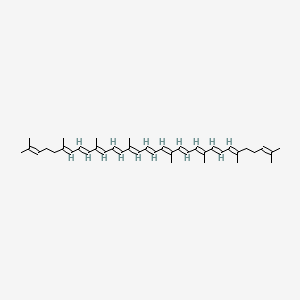| MeSH term | MeSH ID | Detail |
|---|---|---|
| Adenocarcinoma | D000230 | 166 associated lipids |
Lycopene
Lycopene is a lipid of Prenol Lipids (PR) class. Lycopene is associated with abnormalities such as Consumption-archaic term for TB, Chronic disease, Dehydration, furuncle and Cardiovascular Diseases. The involved functions are known as Cell Differentiation process, Signal Transduction, Biochemical Pathway, Mutation and IGF-1 Signaling Pathway. Lycopene often locates in Body tissue, Hepatic, Blood, Adipose tissue and Structure of parenchyma of lung. The associated genes with Lycopene are EPB41L2 gene, VEGFB gene, P4HTM gene, FATE1 gene and SLC33A1 gene. The related lipids are Micelles, Liposomes, Total cholesterol, Steroids and apo-10'-lycopenoic acid. The related experimental models are Mouse Model, Knock-out, Cancer Model, Transgenic Model and Xenograft Model.
Cross Reference
Introduction
To understand associated biological information of Lycopene, we collected biological information of abnormalities, associated pathways, cellular/molecular locations, biological functions, related genes/proteins, lipids and common seen animal/experimental models with organized paragraphs from literatures.
What diseases are associated with Lycopene?
Lycopene is suspected in Chronic disease, Cardiovascular Diseases, Atherosclerosis, Congenital contractural arachnodactyly, Myocardial Infarction, Cerebrovascular accident and other diseases in descending order of the highest number of associated sentences.
Related references are mostly published in these journals:
| Disease | Cross reference | Weighted score | Related literature |
|---|
Possible diseases from mapped MeSH terms on references
We collected disease MeSH terms mapped to the references associated with Lycopene
PubChem Associated disorders and diseases
What pathways are associated with Lycopene
There are no associated biomedical information in the current reference collection.
PubChem Biomolecular Interactions and Pathways
Link to PubChem Biomolecular Interactions and PathwaysWhat cellular locations are associated with Lycopene?
Visualization in cellular structure
Associated locations are in red color. Not associated locations are in black.
Related references are published most in these journals:
| Location | Cross reference | Weighted score | Related literatures |
|---|
What functions are associated with Lycopene?
Related references are published most in these journals:
| Function | Cross reference | Weighted score | Related literatures |
|---|
What lipids are associated with Lycopene?
Related references are published most in these journals:
| Lipid concept | Cross reference | Weighted score | Related literatures |
|---|
What genes are associated with Lycopene?
Related references are published most in these journals:
| Gene | Cross reference | Weighted score | Related literatures |
|---|
What common seen animal models are associated with Lycopene?
Cancer Model
Cancer Model are used in the study 'Lack of chemopreventive effects of lycopene and curcumin on experimental rat prostate carcinogenesis.' (Imaida K et al., 2001), Cancer Model are used in the study 'Oxidative DNA damage in prostate cancer patients consuming tomato sauce-based entrees as a whole-food intervention.' (Chen L et al., 2001), Cancer Model are used in the study 'Re: Prostate carcinogenesis in N-methyl-N-nitrosourea (NMU)-testosterone-treated rats fed tomato powder, lycopene, or energy-restricted diets.' (Limpens J et al., 2004), Cancer Model are used in the study 'Lycopene inhibits IGF-I signal transduction and growth in normal prostate epithelial cells by decreasing DHT-modulated IGF-I production in co-cultured reactive stromal cells.' (Liu X et al., 2008) and Cancer Model are used in the study 'Can smoke-exposed ferrets be utilized to unravel the mechanisms of action of lycopene?' (Wang XD, 2005).
Knock-out
Knock-out are used in the study 'Lycopene attenuated hepatic tumorigenesis via differential mechanisms depending on carotenoid cleavage enzyme in mice.' (Ip BC et al., 2014), Knock-out are used in the study 'In silico identification of gene amplification targets for improvement of lycopene production.' (Choi HS et al., 2010) and Knock-out are used in the study 'Dietary tomato powder inhibits alcohol-induced hepatic injury by suppressing cytochrome p450 2E1 induction in rodent models.' (Stice CP et al., 2015).
Mouse Model
Mouse Model are used in the study 'Tomatoes, tomato-based products, lycopene, and cancer: review of the epidemiologic literature.' (Giovannucci E, 1999), Mouse Model are used in the study 'Prolonged tomato juice consumption has no effect on cell-mediated immunity of well-nourished elderly men and women.' (Watzl B et al., 2000) and Mouse Model are used in the study 'Executive summary report.' (Davis CD et al., 2005).
Related references are published most in these journals:
| Model | Cross reference | Weighted score | Related literatures |
|---|
NCBI Entrez Crosslinks
All references with Lycopene
Download all related citations| Authors | Title | Published | Journal | PubMed Link |
|---|---|---|---|---|
| Leal M et al. | Effect of lycopene on lipid peroxidation and glutathione-dependent enzymes induced by T-2 toxin in vivo. | 1999 | Toxicol. Lett. | pmid:10514025 |
| Wang K et al. | Retinoids activate the RXR/SXR-mediated pathway and induce the endogenous CYP3A4 activity in Huh7 human hepatoma cells. | 2006 | Toxicol. Sci. | pmid:16632523 |
| Srinivasan M et al. | Lycopene: An antioxidant and radioprotector against gamma-radiation-induced cellular damages in cultured human lymphocytes. | 2009 | Toxicology | pmid:19450652 |
| Karahan I et al. | Protective effect of lycopene on gentamicin-induced oxidative stress and nephrotoxicity in rats. | 2005 | Toxicology | pmid:16125832 |
| Yilmaz S et al. | Protective effect of lycopene on adriamycin-induced cardiotoxicity and nephrotoxicity. | 2006 | Toxicology | pmid:16325981 |
| Atessahin A et al. | Effects of lycopene against cisplatin-induced nephrotoxicity and oxidative stress in rats. | 2005 | Toxicology | pmid:15946783 |
| Aydin S et al. | The carotenoid lycopene protects rats against DNA damage induced by Ochratoxin A. | 2013 | Toxicon | pmid:23867521 |
| Russo M et al. | Phytochemicals in cancer prevention and therapy: truth or dare? | 2010 | Toxins (Basel) | pmid:22069598 |
| Giuliano G et al. | Carotenoid isomerase: a tale of light and isomers. | 2002 | Trends Plant Sci. | pmid:12399171 |
| Hackshaw-McGeagh L et al. | Prostate cancer - evidence of exercise and nutrition trial (PrEvENT): study protocol for a randomised controlled feasibility trial. | 2016 | Trials | pmid:26948468 |
